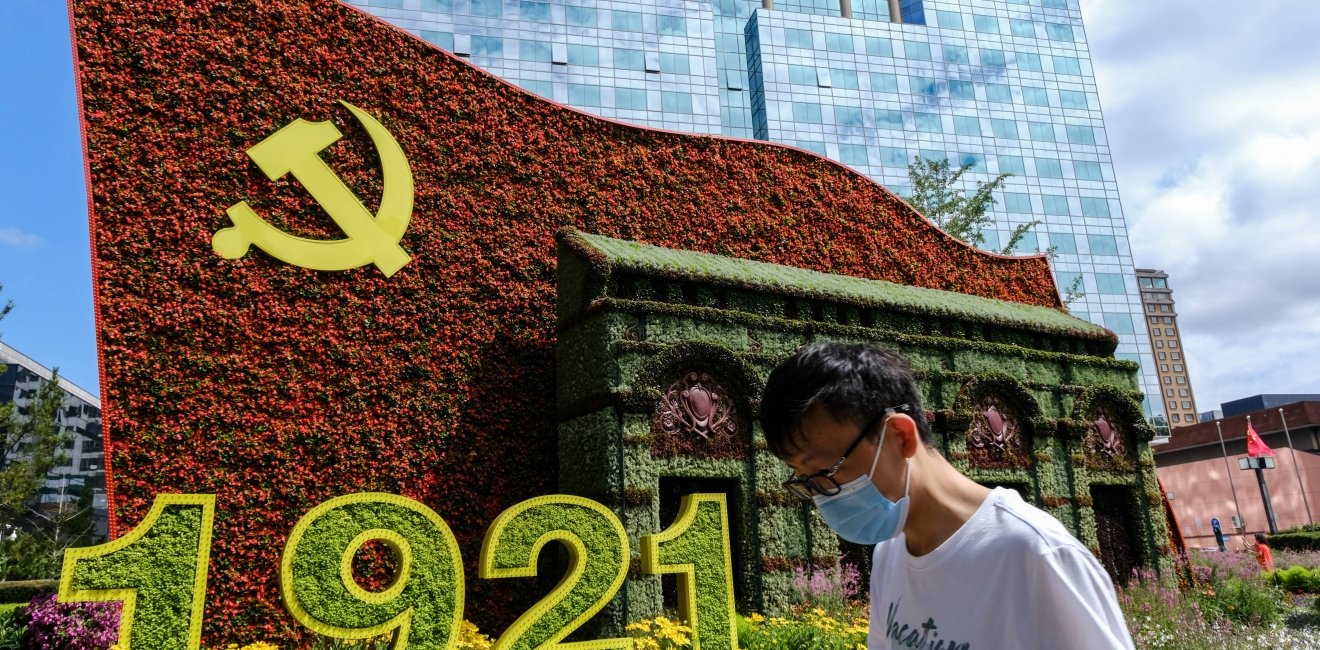On July 1, thousands of Communist Party youth members flooded Chang'an Avenue, at the heart of the nation’s capital, singing songs like “Without the Communist Party, There Would Be No New China” to serenade Chinese President Xi Jinping. The highly televised tribute marked the beginning of the Chinese government’s centenary celebration and projected a youthful image of the Communist Party (CCP). Yet, despite this powerful display of patriotism, the reality of Party efforts to advance youth engagement through media is much more complicated.
The CCP’s hundredth anniversary celebrations sought to reaffirm the Party’s vital role in China’s future. For such a forward-looking vision, youth engagement is essential. Of the 4.7 million new Party members accepted this year, more than eighty percent have been below 35 years of age. An emphasis has been placed on enlisting recent graduates of China’s top engineering schools as the country remains ensnared in a high-tech competition with the US. But, as Xi makes an effort to indoctrinate a new generation of supporters, the Party’s anniversary media blitz raises questions of the CCP’s long-term stability.
Beginning with the 70th anniversary of the People’ Republic of China in 2019, patriotic films and TV shows have become increasingly youth-oriented, employing popular genres and “star power” in order to garner widespread appeal. In preparation for the CCP’s 100th anniversary, the National Radio and Television Administration (NRTA) encouraged China’s Entertainment industry to produce an impressive slate of commemorative content that would highlight the Party’s history and its role in economic reforms. Tencent Pictures’ 1921 (Huang Jianxin), the centenary’s flagship film, features a star-studded cast of popular young actors, including Wang Renjun, Huang Xuan and Zhu Yilong as three of the CCP’s founders Mao Zedong, Li Dazhao and Zhou Enlai. Poverty alleviation dramas, a TV genre popularized to recognize Xi’s “victory” in a campaign to eradicate extreme poverty, have also been outfitted with teen idols and incorporate aspects of romance and comedy that are aimed at a younger fan base. The National Children's Evening Party to Celebrate the 100th Anniversary of the Founding of the Communist Party of China, a special Children’s Day event that simultaneously premiered across all major stations and streaming platforms, features Party-themed songs and dances that even the nation’s youngest patriots can appreciate. Speaking at the Party History Study and Education Mobilization Conference in February 2021, Xi expressed his hope for such Party history-themed works to “pass the ‘red gene’ from generation to generation.”
The Chinese authorities can dictate the type of content that is made, however, tensions between commercial film markets and actual consumer interests remain. Chinese film regulators ordered every cinema to screen and promote films celebrating the Party’s history and accomplishments, with more than 5,000 theaters required to screen five such films a week. Local film authorities were further instructed to provide CCP commemorative films with favorable scheduling and, if necessary, offer promotional discounts to ensure a large audience.
Contradictions inherent to the idea of Party “blockbusters'' highlight how China’s youth present a tough audience. Even after endorsement from the Chinese film regulators and a state-sanctioned premiere at the Shanghai International Film Festival, the commemorative film 1921 was publicly scorned for making a mockery of the CCP’s history and its founders. Patriotic netizens questioned the film’s faithfulness to Party values for assigning social media icons, boyband superstars, and other beneficiaries of an enterprise culture to play some of China’s greatest communist heroes. They launched a campaign, “#Boycott1921,” attracting millions of viewers. Viewers also reported the film to the Cyberspace Administration of China for the “defamation of martyrs and heroes,” an act that was made criminal in 2018. Before either of these movements could gain traction, however, censors quashed them. Herein lies the larger existential threat to the Party’s legitimacy. As Xi attempts to shore up support for the regime, China’s youth recognized inconsistencies between Party principles and propaganda.
“Red” content is struggling to find an audience. After 1921 grossed $13 million on July 1, a relatively poor performance compared to past tent pole films, especially given the arranged lack of competition, viewer ratings on Douban sank so low that the ratings function had to be shut off. Other tribute films fared far worse. The Pioneer (Xu Zhanxiong), which recounts the life of CCP founder Li Dazhao, grossed little more than $2.5 million in China on its opening day, with audience attendance averaging below 3%. Though some filmgoers share that they were moved to tears by these Party origin stories, many report being unimpressed.
Ultimately, despite its efforts to advance content in the service of the CCP’s 100th anniversary, the Party faces the same challenges it always has in the promotion of media to advance political interests. Audiences - particularly youth audiences - have commercial tastes that don’t always align with the “red gene.” And the reliance on Chinese stars who emerge from China’s commercial media industry, while popular, fails to align with the Party’s ideological message. As China’s young people know, commanding a performance and finding a willing audience are two very different things.
Authors

Associate Professor of Media Studies, University of Virginia and Senior Faculty Fellow, Miller Center for Public Affairs.

Kissinger Institute on China and the United States
The Kissinger Institute works to ensure that China policy serves American long-term interests and is founded in understanding of historical and cultural factors in bilateral relations and in accurate assessment of the aspirations of China’s government and people. Read more


Indo-Pacific Program
The Indo-Pacific Program promotes policy debate and intellectual discussions on US interests in the Asia-Pacific as well as political, economic, security, and social issues relating to the world’s most populous and economically dynamic region. Read more

Explore More
Browse Insights & Analysis
Building a Thriving Ukrainian Design Community Now

Чудеса в глазах смотрящего

Уехал на СВО

